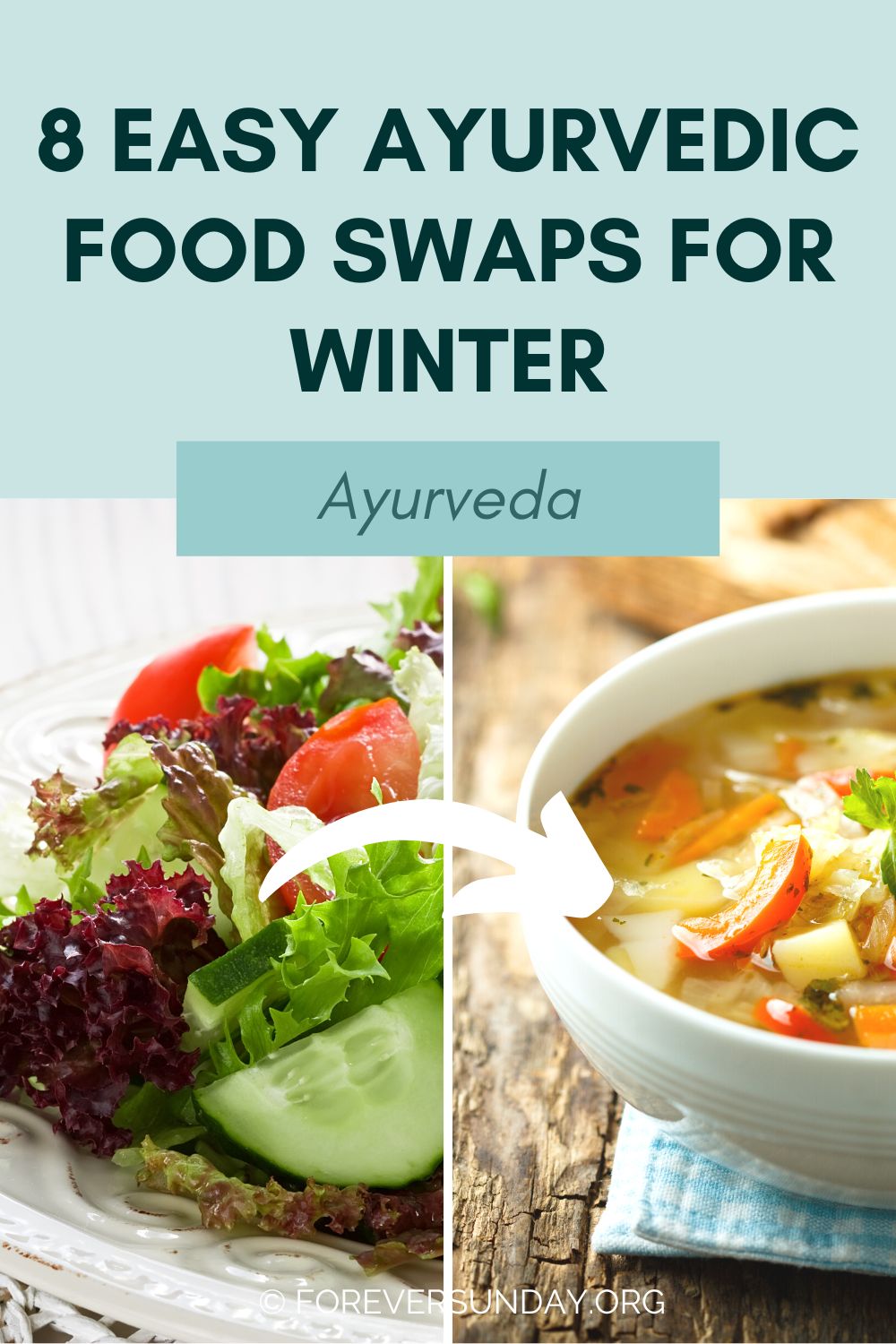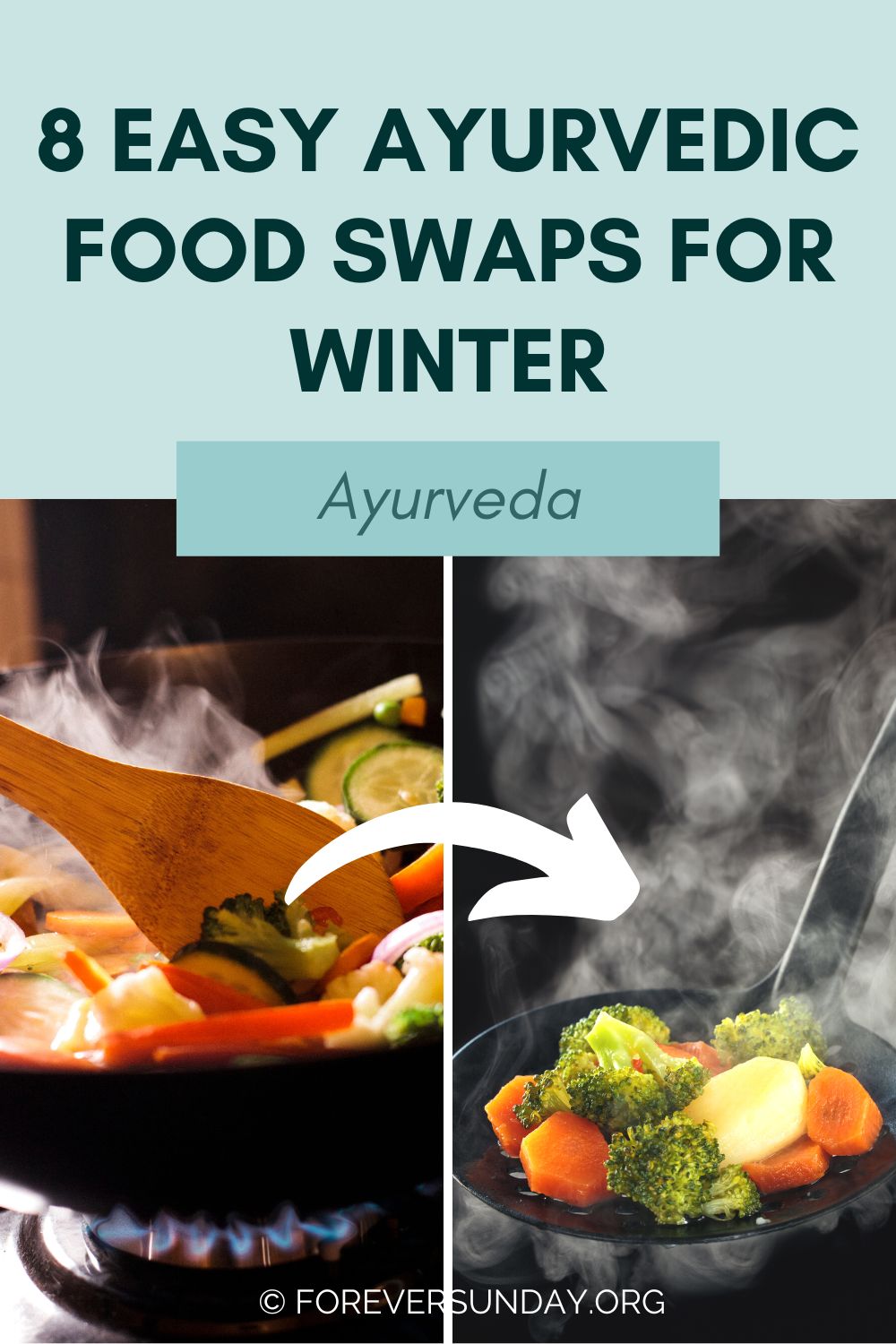We have the longest night behind us, but we’re still in the deep end of winter. You might have noticed your digestion is slower, you’re sleeping more and have less motivation to exercise. Here are a few easy Ayurvedic food swaps for winter to stay balanced. Make these swaps if you’re Kapha dominant or have a Kapha imbalance.
Read more about Kapha imbalances in this article.

Swap raw foods for cooked foods
Cooked foods are more easily digestible than raw foods. Since Kapha digestion is slower, we need to help it a little by eating foods that are easier to digest. Raw food is hard to digest, requiring Agni (digestion) to be strong and is only really recommended in summer. If you’ve noticed bloating and difficult digestion, stay away from raw foods for a while. At least until the weather gets warmer!
Swap cold drinks for hot drinks
Another way to support our digestion in winter is to try and fire up our digestion. You can do this by adding heating (and hot) drinks to your daily liquid intake. So drink a ginger lemon tea, or a cinnamon tea instead of ice cold plain water.
Please note that it’s not great for the enamel on your teeth to sip lemon water or lemon tea all day long. Have it in one go and rinse with some lukewarm water to protect your teeth!
Try swapping cold smoothies and cold pressed juices for warm, spiced milk: In winter, it’s best to avoid cold drinks and opt for warm, nourishing beverages like spiced milk. Heat milk on low heat, add some warming spices like cinnamon, cardamom, and nutmeg. Avoid sweetening your drinks in winter or try to reduce it.
Read more about why smoothies are not good for you in this article.
Swap frying, deep frying or baking for steaming and boiling
In winter we tend to go more for oily foods and choose frying over other preparation methods. But as we transition from Vata to Kapha season, it’s better to steam or boil vegetables instead. Steaming especially keeps nutrients more intact, and is best to balance Kapha.

Swap raw foods for cooked fruits
Swap raw fruits for cooked fruits: In winter, it’s best to eat fruits that are cooked or baked, as they are easier to digest and have a warming effect on the body. Try baked apples, pears, or stewed fruits with warming spices.
Swap oily foods for drying foods like beans and legumes
Legumes and beans not only are a great source of protein, but they also have a drying and scraping effect, clearing the channels in the body that have become blocked by too many sweet and oily foods. For those with a Vata imbalance it is not the best choice (eat in moderation and prepare appropriately with the right spices), but in winter you could really benefit from eating more beans and legumes.
Swap root vegetables for more greens
OK, I’m absolutely not saying to drop the root vegetables here. I love root vegetables. I can’t imagine my life without carrots, beetroots and parsnips! But if you’re only having these kinds of vegetables, you will benefit from adding more greens to your diet in winter. Especially as we go towards spring, fresh greens will be popping up everywhere. Kale, collards, spinach, other leafy greens, broccoli, all kinds of cabbage will be good for you. Eat at least one portion of greens a day, every day.
Swap your overnight oats for hot porridge
Instead of eating cold cereals, try making hot porridge with whole grains like oats, quinoa, or amaranth. Add warming spices like cinnamon, ginger, and cardamom for added flavor and warmth. You can also add apple or pear when you are cooking the porridge to sweeten your meal.
Swap cold sandwiches for warm, hearty stews
While sandwiches can be a quick and easy meal, they may not be the most warming or nourishing option in the winter. Instead, try making hearty stews or soups with warming spices like ginger, garlic, and cumin, which can help keep you warm and satisfied.




